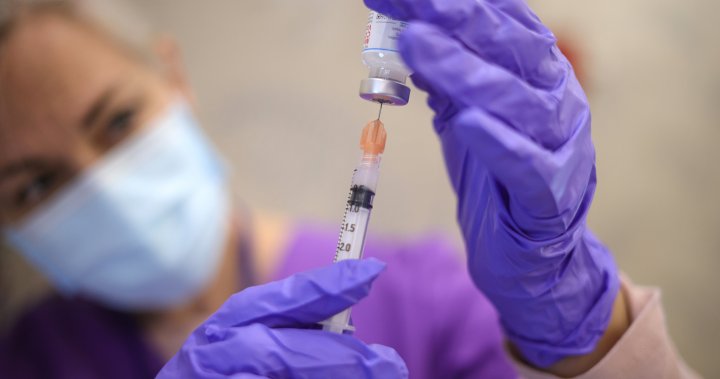With the arrival of the latest COVID-19 variants within the country and the looming flu season on the horizon, many Canadians may be wondering if they should get their booster shot immediately or wait until the newest vaccine formulations arrive.
The updated booster shots are expected to roll out in the fall but are still pending approval by Health Canada. The new vaccines are also tailored to the dominant XBB.1.5 Omicron subvariants that are currently circulating in the country.
Although bivalent COVID-19 vaccines are currently available in Canada, the National Advisory Committee on Immunization (NACI) previously said in July that the fall boosters will target more recent, immune‑evasive SARS-CoV-2 variants.
Some health experts say you might be better off waiting until the updated vaccines are available, while others say not to wait. This leaves Canadians grappling with a crucial decision: whether to get their booster shot immediately or hold off.

“It is it is well and truly confusing,” Kerry Bowman, a professor of bioethics and global health at the University of Toronto, said. “I think we’re getting an incredible lack of clarity as to what should occur. I wish we had stronger guidelines from public health. I feel like we’re on our own on this one.”
Adding to the confusion, he said, is the fact that some people have said they will get both shots, one now and the reformulated version when it becomes available. However, this approach is discouraged, Bowman said, emphasizing that it is advisable to wait at least six months between vaccine shots.
Here’s what health officials are saying about the fall booster shot.
In its latest guidance on July 11, “NACI recommends a dose of the new formulation of COVID-19 vaccine for people in the authorized age groups who have previously received a COVID-19 vaccine, if it has been at least 6 months since the last COVID-19 vaccine dose or known SARS-CoV-2 infection (whichever is later).”
It noted the new formulations expected this fall should provide a better immune response to the dominant subvariants. It did not specify whether Canadians should get the current formulation of the booster if the updated version was not available by fall.
“Booster doses in the fall will be formulations updated to target more recent, immune‑evasive SARS-CoV-2 variants,” NACI said in its updated vaccine recommendations.
“Individuals vaccinated with the updated formulation are expected to benefit from a better immune response against these variants compared to current vaccines.”
It emphasized is particularly important for those at increased risk of COVID-19 infection or severe disease including those 65 and over, long-term care residents, people who are pregnant and those with underlying conditions, to get immunized.
What Health Canada is saying
In an email to Global News on Monday, a spokesperson from Health Canada said it encourages “all Canadians to make sure that their COVID-19 vaccination is up to date.”
“Vaccination is one of the most effective ways to protect against COVID-19. All approved COVID-19 vaccines used in Canada continue to be very effective at protecting against severe illness, hospitalization and death from COVID-19.”
The health agency did not specify in its response whether Canadians should wait until the updated formulations become available.
The health department’s website is in line with NACI’s guidance, stating that COVID-19 booster doses may be offered at an interval of six months after a previous COVID-19 vaccine dose (after completion of the primary series or previous booster dose) or SARS-CoV-2 infection, regardless of the product offered.
Bivalent vaccines are the preferred vaccine for booster doses among individuals in the authorized age groups, Health Canada stated on its website, in addition to containing mRNA that encodes the spike protein of the original strain, they contain mRNA that encodes the spike protein of strains of the Omicron variant of concern.
NACI’s updated guidelines have not been added to the Health Canada website.
The World Health Organization on Thursday said it recommends getting a booster or additional dose within six to 12 months, depending on your risk category.
Those who are most at risk should get their booster right away if they are due for one, said Dr. Maria Van Kerkhove, the WHO technical lead on the COVID-19 response, during a WHO question and answer session on social media.
For those who are most at risk, it is “very critical that you get a booster, and don’t wait,” she stressed. “The big message I have for you is don’t wait for the next round of vaccines.”

Previously, on March 28, the WHO said it no longer “routinely recommends” additional COVID-19 vaccine boosters for medium or low-risk people.
The WHO recommended additional booster doses for high-priority groups such as older people, immunocompromised people of all ages, front-line health workers and pregnant people. But for those who fall under the low and medium-risk group, WHO did not recommend additional COVID-19 boosters, citing “low public health returns.”
What health experts are saying
A strong majority of Canadians have hybrid immunity from the virus through natural infection and vaccines.
Because of this, Bowman said part of the confusion surrounding the COVID-19 fall booster is “understandable.”
“This is a very different pandemic profile than what we’ve been dealing with in the past, and whether to get a booster now or later could depend on the risks that that you are facing,” he explained. “So the short answer is, if you have risk factors, go ahead and get it now. ”
But there’s a lot of grey area.
For example, he said if someone is a healthy 25-year-old, but is living with a person who has advanced cancer and is going through chemotherapy, this creates uncertainty.
“We’re getting an incredible lack of clarity as to what should occur,” he said, adding that because there are new variants circulating, the level of risk and appropriate precautions have become even more challenging to determine.
With so much uncertainty, Bowman argued now is not the time for public health to go quiet, but instead, it’s a time for more guidance.
“I think most of us understand it’s no longer one size fits all, but we still need a lot more help with it than what we’re getting,” he said.

Dawn Bowdish, an immunologist at McMaster University in Hamilton, told the Canadian Press the mutating virus puts vulnerable populations, including the elderly, most at risk of infection.
However, only about 21 per cent of Canadians aged 80 and over have received boosters or completed a primary vaccination series in the last six months, she said.
Anyone starting chemotherapy or having major surgery may consider getting a booster before the reformulated vaccines are available but it’s otherwise best to wait, Bowden stressed.
Dr. Gerald Evans, an infectious disease specialist at Queen’s University in Kingston, Ont., said it would be ideal if XBB vaccines were available now before the flu season began.
“It would be great to have it as early as possible,” he said. “Once Health Canada says ‘yes we approve,’ then the manufacturer is the part that creates a bit of a delay. My hope is that delay will be extremely short-lived as there are a lot of people who are due for boosters now, including young, healthy people, where we say just get it once a year.”
He added that if “we can get those out and into people’s arms in September,” it could potentially help curb the ongoing surge in COVID-19 cases.
What is the status of the fall COVID-19 booster?
Health Canada is currently reviewing three new vaccine vaccines containing the XBB.1.5 Omicron subvariant, for those six months and older. It is reviewing submissions from Pfizer-BioNtech, Moderna and Novavax.
While no specific rollout date has been established, it is anticipated that Pfizer and Moderna vaccines will likely receive approval in the fall, with the Novavax shot following at a later date, Health Canada said in an email Monday.
“The authorization and availability of new vaccines will depend on many factors including the submission date, the review timelines, the acceptability of the information submitted and the supply of the vaccine by the manufacturer. If authorized, Canada will have ample supply of the new formulation of mRNA vaccines available in Fall 2023,” the spokesperson stated.

Canada will also have access to non-mRNA vaccine (Novavax) for those who are unwilling or unable to receive an mRNA shot, Health Canada said.
“We are anticipating it will be available later this year, pending a submission to, and authorization by, Health Canada.”
Public Services and Procurement Canada told Global News in an email Monday that it has agreements in place to procure the latest COVID-19 vaccines, ensuring Canada has the right quantity of doses it needs for 2023 to 2024.
“This includes agreements with Pfizer, Moderna and Novavax, currently allowing for up to 33 million doses that will be manufactured from their respective off-shore facilities and delivered in the fall/winter 2023, pending Health Canada regulatory approvals,” the spokesperson said.
Where do other countries stand on COVID-19 boosters?
Like Canada, the rollout of the COVID-19 booster shots in the United States is expected in the fall, according to the U.S. Food and Drug Administration (FDA).
The updated booster is expected to be cleared by the FDA ahead of a Centers for Disease Control and Prevention (CDC) vaccine advisory panel, which is scheduled to meet on Sept. 12 to vote on whether to recommend the updated vaccines, NBC News reported.
In England health officials on Wednesday said vaccinations will be available starting Sept. 11 (rather than the original October release date) as a precautionary measure intended to protect the most vulnerable as the winter months approach.
— with files from the Canadian Press



